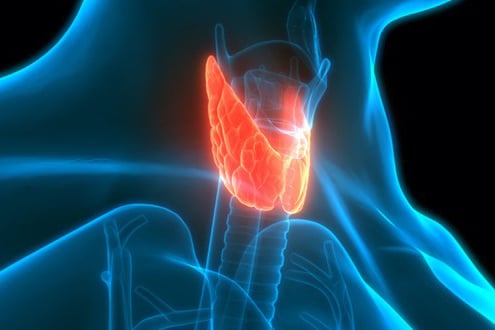Thyroid Cancer Treatment Information
Patients who are concerned about thyroid cancer symptoms, or who have been diagnosed and require treatment, can turn with confidence to Moffitt Cancer Center, the only National Cancer Institute-designated Comprehensive Cancer Center based in Florida.
What is thyroid cancer?
Thyroid cancer develops in the thyroid, a gland located at the base of the throat. The thyroid produces important hormones that help control the body’s heart rate, blood pressure, and metabolism.
So, what is cancer of the thyroid? Cancer can form when some of the cells that make up the thyroid tissue grow and multiply at a very rapid pace. The resulting buildup of extra cells can form a mass, or tumor, that can potentially become cancerous. Malignant cells can also break away from the thyroid and travel through the lymph nodes or blood vessels and invade other parts of the body.
Types of thyroid cancer
Thyroid cancer can be divided into different types based on the origin of the abnormal cells, and then divided again into different subtypes based on the cells’ individual characteristics. The four main types of thyroid cancer include:
- Papillary, which is the most common type of thyroid cancer
- Follicular, which accounts for approximately 10% to 15% of all thyroid cancer cases
- Medullary, which accounts for approximately 5% to 10% of all thyroid cancer cases
- Anaplastic, which accounts for approximately 5% of all thyroid cancer cases
Thyroid cancer symptoms
Most often, the initial sign of thyroid cancer is a noticeable lump (nodule) or swollen area at the front of the neck. These lumps, which are often palpable and sometimes even visible, generally develop near the base of the neck, above the breastbone (sternum). It’s common for the lumps to grow at a rapid pace, but they will typically be painless.
Other potential symptoms of thyroid cancer include:
- Throat soreness
- A feeling of fullness within the neck
- A choking sensation
- Difficulty breathing and/or swallowing
- Persistent, unexplained coughing
- Hoarseness and other changes to the voice
- Ear pain
- Fatigue
Thyroid cancer causes
Researchers are still working to determine exactly what causes thyroid cancer. With that being said, studies suggest that genetics may play a role in the development of thyroid cancer, since the malignancy has been associated with a few inherited traits. Another potential cause of thyroid cancer is exposure to radiation, especially during childhood.
Thyroid cancer risk factors
The following risk factors can increase a person’s chances of developing thyroid cancer:
- Being between the ages of 25 and 65
- Being a woman
- Having an enlarged thyroid (goiter)
- Having a family history of thyroid disease
- Radiation exposure during childhood
- Eating a diet low in iodine
It must be noted that having one or more of these risk factors does not mean that someone will assuredly develop thyroid cancer; it simply means that their chances of developing the malignancy are greater. Some individuals have multiple risk factors and never develop thyroid cancer, while others are diagnosed without having any known risk factors.
Thyroid cancer diagnosis

As was noted above, thyroid cancer is often diagnosed after finding a lump or swelling at the front of a patient’s neck. However, because many thyroid nodules are benign, the diagnostic process requires a complete and thorough clinical assessment, along with imaging, biopsy and blood testing.
Thyroid cancer stages
Thyroid cancer is often staged using the American Joint Committee on Cancer’s TNM system:
- Tumor ("T") – The size and location of the primary tumor
- Node ("N") – Whether the cancer has spread to the lymph nodes
- Metastasis ("M") – Whether the cancer has spread (metastasized) to other areas of the body
A physician will assign each of these categories a number—from 0 to 4—with higher numbers indicating greater severity. The combined values will then be used to assign a thyroid cancer stage, ranging from stage 1 to stage 4.
Thyroid cancer treatment
Treatment for thyroid cancer will vary from one patient to another based on a number of factors, such as the patient’s age and overall condition as well as the extent of the malignancy. Treatment may involve:
- Surgery
- Radioactive iodine therapy (RAI)
- External beam radiation therapy (EBRT)
- Multikinase inhibitor targeted therapy
Thyroid cancer survival rates
Thyroid cancer survival rates depend on various factors, including:
- The patient’s age
- The size of the tumor
- Whether the cancer has begun spreading to other areas of the patient’s body, and if so, how far it has spread
- How successful was the initial surgical treatment was
Our approach

"I just knew Moffitt's reputation, and I knew that when you had cancer that's where you want to go."
Sarah, Thyroid Cancer Survivor
Request an AppointmentAt Moffitt, our patients have access to a multispecialty team of experts who take a highly collaborative and coordinated approach to providing all aspects of cancer care in a single, convenient location. Our Endocrine Program offers patients a highly streamlined option for the evaluation and treatment of thyroid cancer and other conditions with an accelerated assessment of thyroid nodules (based on guidelines established by the American Thyroid Association), including:
- Initial patient consultation
- Clinical examination
- Imaging
- Biopsy
- Blood testing
In keeping with our commitment to providing outstanding patient care, Moffitt developed this efficient and well-run approach to accomplish what previously involved multiple office visits that were often spread over the course of four to six weeks. The bottom line is significant: Moffitt’s patients are diagnosed faster, which means they can begin treatment and achieve peace of mind sooner. This is one reason why our cancer survival rates outrank national averages and our patients enjoy higher-quality lives.
We invite patients, survivors, families and friends to join Moffitt's Endocrine Support Group. This group offers support and education on endocrine-related cancers.
To learn more about our thyroid cancer services, please call 1-888-663-3488 or complete our new patient registration form online. You are a top priority of a cancer center that delivers nationally-ranked care in new and transformative ways, and as such, you can expect to be connected to a cancer expert as soon as possible. Our rapid response times—allow us to start treatment as soon as possible when needed, thereby helping to ensure the best possible outcomes and quality of life.
References
National Cancer Institute: Thyroid Cancer
American Thyroid Association
Support the Future of Endocrine Oncology Research and Treatment
When you support Moffitt Cancer Center, you help make breakthrough endocrine research and innovative treatments possible. Give now to support the Endocrine Oncology Program. For more information, call toll-free 1-800-456-3434, ext. 1403.



